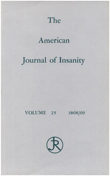Double-blind, controlled trial of inositol treatment of depression
Abstract
OBJECTIVE: CSF levels of inositol have been reported to be lower than normal in depressed subjects. The authors administered inositol to depressed patients in a double-blind, controlled trial. METHOD: Under double-blind conditions, 12 g/day of inositol (N = 13) or placebo (N = 15) was administered to depressed patients for 4 weeks. RESULTS: The overall improvement in scores on the Hamilton Depression Rating Scale was significantly greater for inositol than for placebo at week 4. No changes were noted in hematology or in kidney or liver function. CONCLUSIONS: This may be the first use of the precursor strategy for a second messenger rather than a neurotransmitter in treating depression. Although inositol had a significant antidepressant effect in this study, replication is crucial.
Access content
To read the fulltext, please use one of the options below to sign in or purchase access.- Personal login
- Institutional Login
- Sign in via OpenAthens
- Register for access
-
Please login/register if you wish to pair your device and check access availability.
Not a subscriber?
PsychiatryOnline subscription options offer access to the DSM-5 library, books, journals, CME, and patient resources. This all-in-one virtual library provides psychiatrists and mental health professionals with key resources for diagnosis, treatment, research, and professional development.
Need more help? PsychiatryOnline Customer Service may be reached by emailing [email protected] or by calling 800-368-5777 (in the U.S.) or 703-907-7322 (outside the U.S.).



